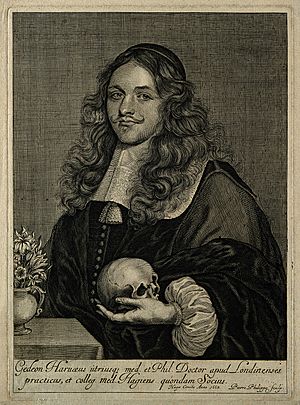Gideon Harvey facts for kids
Quick facts for kids
Gideon Harvey the Elder
|
|
|---|---|

Line engraving by P. Philippe (1663)
|
|
| Born | c. 1636–1640 Holland, Dutch Republic
|
| Died | c. 1700–1702 London, England
|
| Alma mater | Exeter College, Oxford Leyden University |
| Scientific career | |
| Fields | Physician |
Gideon Harvey (born around 1636–1640 – died around 1700–1702) was a doctor from Holland and England. He was known for his unique ideas about medicine and his lively writing style.
Contents
Life of Gideon Harvey
Early Education and Travels
Gideon Harvey was likely born in Holland between 1630 and 1640. His parents were John and Elizabeth Harvey. He learned Greek and Latin in his home country.
In 1655, he started studying philosophy at Exeter College, Oxford in England. Then, in 1657, he went to Leyden University in Holland. There, he focused on medicine, anatomy, and botany. He also learned chemistry from a German teacher. He even got lessons from a surgeon and an apothecary (someone who prepared medicines).
After Leyden, Harvey traveled to Paris, France. He continued his studies and visited hospitals there. He earned his medical degrees, probably from a smaller French university. He later said he got his final degree very young, but this might have been an exaggeration.
Career as a Physician
After finishing his studies, Harvey returned to Holland. He became a fellow of the College of Physicians at The Hague. He was in London during a time when England had no king (the Interregnum). In 1659, he was chosen to be a doctor for the army in Dunkirk.
After the king returned to power (the Restoration), Harvey became a doctor for the King's army in Flanders. He later left this job and traveled through Germany and Italy. After his travels, he settled in London and became a physician there. He never joined the main Royal College of Physicians in London.
Serving the King
Around 1675, Gideon Harvey became a physician to King Charles II. He was sometimes called to help with important medical cases. In 1678, he attended a nobleman who was hurt in a duel. Harvey wrote about this case, using it to criticize other doctors involved.
In 1683, Harvey published a book called The Conclave of Physicians. This book made fun of the College of Physicians. King Charles II seemed to enjoy this criticism. Harvey continued to be successful in his medical practice.
Later, when King William and Queen Mary came to power, Harvey was given a special job. He became "their majesties' physician of the Tower." This was a well-paying job that he kept until his death around 1700–1702. His son, Gideon Harvey the Younger, took over this role after him.
Harvey's Medical Ideas
Gideon Harvey wrote many books, but his medical ideas are not considered scientifically important today. He often used humor in his writing. He was known for making fun of old-fashioned medicines. For example, he criticized treatments like theriaca and mithridatium, which were old remedies.
However, he also disagreed with some effective treatments. He was strongly against using Peruvian bark, which contained quinine and was used to treat fevers. One of his books, The Art of Curing Diseases by Expectation, became popular in Europe. It talked about how sometimes diseases might get better on their own.
Later in his life, Harvey changed some of his earlier medical views. He wrote a book called The Vanities of Philosophy and Physick. This book showed his general doubt about some medical theories. His writings are still useful today because they show us what medical practices and people were like in his time.
Harvey's Published Works
Gideon Harvey wrote many books and pamphlets. Here are a few examples of his works:
- Archelogia Philosophica Nova (1663) - About new ideas in philosophy.
- Discourse of the Plague (1665) - Discussing the plague.
- Morbus Anglicus, or the Anatomy of Consumptions (1666) - About diseases like tuberculosis.
- The Accomplisht Physician, the honest Apothecary, and the skilful Chyrurgeon (1670) - About different medical roles.
- The Disease of London, or a new Discovery of the Scorvey (1675) - About scurvy.
- The Family Physician and House-apothecary (1676) - A guide for families.
- The Conclave of Physicians (1683) - His critical book about doctors.
- The Art of Curing Diseases by Expectation (1689) - About letting diseases heal naturally.
- The Vanities of Philosophy and Physick (1699) - Where he changed some of his earlier views.
Gideon Harvey the Younger
Gideon Harvey the Younger (born around 1669 – died 1754) was the son of the elder Gideon Harvey. He also became a physician. He studied at Leyden University in Holland, just like his father. He earned his medical degree there in 1690.
In 1698, he received another medical degree from Cambridge University in England. He became a fellow of the College of Physicians in London in 1702. Around the same time, he took over his father's job as the King's physician to the Tower. He was the oldest fellow of the college when he died in 1754 or 1755. He did not publish any books.
 | Janet Taylor Pickett |
 | Synthia Saint James |
 | Howardena Pindell |
 | Faith Ringgold |

